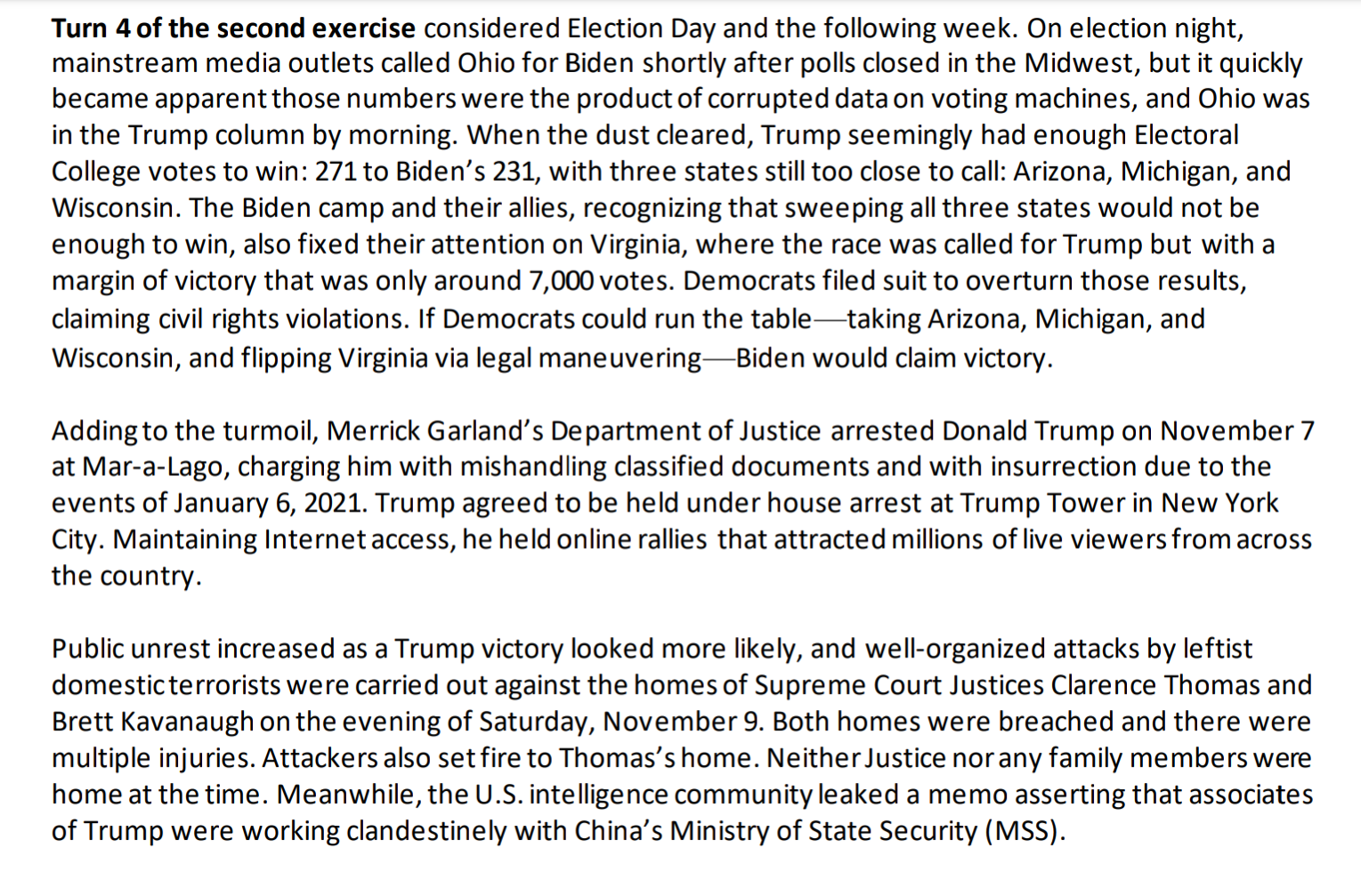Same, felt weird.
Beyond that, I learned about it via a particularly cold meme.

Same, felt weird.
Beyond that, I learned about it via a particularly cold meme.


https://www.theguardian.com/us-news/article/2024/jul/12/heritage-foundation-mike-howell-election
The document with it’s horrible URL escaped after the edit
Mike Howell, executive director of the Oversight Project at the Heritage Foundation, made the comments at an event in Washington sharing the results of a hypothetical exercise mapping out several implausible scenarios that could take place after the election. The outlandish scenarios involved Barbara Streisand being kidnapped by Hamas, antifa-BLM protesters taking over a detention facility and the FBI arresting Donald Trump after winning the election.
The effort was designed to muddy the waters over the threat to the 2024 election posed by Donald Trump, who has repeatedly refused to commit to accepting the election results and tried to overturn the 2020 vote. Instead, the Heritage Foundation, which is also behind the extreme Project 2025, wanted to suggest that it was Joe Biden who could try to overturn the result of the election, echoing the ex-president’s repeated claims that it is actually Biden who is the threat to democracy.




Impeachment is the decision to press charges, and the Senate trial is closer to the actual trial.
“Charged and convicted” -> “impeached and convicted”
Otherwise a perfectly good analogy. :)
The distinction only matters for people who bring up due process concerns. The impeachment proceedings aren’t actually a trial, but a decision to have one, as such you aren’t obligated to the same ability to speak in your own defense as you would be at a proper trial. With the Senate trial there’s more expectation of due process because it’s an actual trial.


I’d definitely agree that the Amish would be well served seeking enhanced second or even first strike EMP capabilities.
I don’t think the picnic would be taken as a ruse however, only as an unavoidable preamble to any group interaction. My, admittedly limited, interactions with Mormons led me to believe they also have a cultural weakness for the potluck.
So less a ruse, and more of an ambrosia and corn themed version of 1700s troops lining up before battle.


I had to look up the motivation for their beliefs, and now I know a touch more about the Amish.
It’s not about avoiding technology, it’s about avoiding undesired influences on their culture.
As such, I think that a non-violent (they’re a pacifist order) but entirely crippling tool to anyone with a dependence on technology would be perfectly acceptable.
Many orders accept batteries but not connection to the power grid. I have to believe that would extend to capacitor banks, particularly since capacitors predate when the Amish started to eschew technology and not just outsiders.
So it’s gonna be a race to get people into town to buy every super capacitor from every store they can get to, and then get them charging from the windmills.
The Mormons will easily show up before they finish, but with any luck the mutual “hey, hello! Welcome!” picnic and potluck, sharing of hot dishes, and general friendly meet and greet will go on long enough to charge the device and render modern technology obsolete for thousands of miles around them.
It’s not specifically related, but biological neurons and artificial neurons are quite different in how they function. Neural nets are a crude approximation of the biological version. Doesn’t mean they can’t solve similar problems or achieve similar levels of cognition , just that about the only similarity they have is “network of input/output things”.
Their stated reason is to mitigate theft by preventing removal of software that binds the device to the network and account, and to protect their network by blocking paths to custom roms including potentially custom radio firmware.
The real reason is likely a blend of protecting leased devices for resale value, keeping people from removing “sponsored” apps or ones that make them money, and distrust of users ability to not get tricked into abject stupid choices.


I worked for a developer at a Web hosting company for a while. I really wish my story about flaming text wasn’t true, and that the words weren’t “permanent unrecoverable data loss”, and the audience wasn’t internal support technicians.
Gotta have a way to delete a vps, and there’s only so much you can do to get someone to check that they have the right one.


So, sure that might work. More likely they forgot this bit is even here on account of it being 20 years old.
Also, never doubt the persistence of a sufficiently motivated and impatient user. I don’t think needing to read something has ever stopped one.
You can literally put animated flaming text and people will click right past.


Yup, you found the developer. That’s his phone number.
It’s not exactly a new change either. In 2006 people weren’t going to the specific page from duckduckgo, they were probably finding the sqlite homepage, and then tracking down the contact info.
20 years later it’s probably better to maintain consistency with the prefix than to change it even if it’s weird.


More realistically, in that it still won’t happen but it involves more paperwork and less people with guns so the it done easier to get done: use the executive powers to declare their homes national parks open to the general public.
Or order the Treasury department to put them on the list of people banks can’t do business with. One person in the Treasury making a 30 second form entry, and over the next few days it’ll trickle out and freeze their accounts, credit cards, mortgages, and everything. Sure, the random banker involved could override it but they, ironically, have personal criminal liability risk if they do so, and do they really want to risk a decade in prison rather than let the lawyers fight about it?


Because the ruling quite literally says that anything the president does as the president is presumed to have immunity unless the prosecution can argue that applying criminal law couldn’t possibly impact on the core work of the office of the president, and that their motivation for doing what they do can’t be considered when making that determination.
“As the president” Trump asked the justice department to falsely claim it had discovered election fraud as part of a plot to steal the election.
The supreme Court ruled that this is protected because if you ignore his motivation, punishing the president for consulting with the justice department about election fraud would clearly impede the core functions of the office.
Without considering motivation, would punishing the president for transporting documents he has legal access to to a place he’s allowed to take them impact impact the function of the office?
It’s a very bad ruling.


I’m still just amazed that we’re in a place where one bad debate means we talk about nothing but changing candidates for a week and counting, but dozens of criminal felony convictions is just something we roll with.


A thousand voters is actually a perfectly good statistical sampling for the US population.
What matters is that
A thousand people is enough to get you into single digit margin of error for a population the size of the US. If you find them by dialing random landlines, or mailing surveys to people with a voter history, your sample biases towards the demographic that still has landlines or that’s willing to take the time to fill out a paper survey.


Pretty sure my life would be really different if I had had the ability to actually study instead of “read some of the chapter, skip the boring bits and exercises, and then call it good”.
Per the doc, a better than average memory can do a good job masking that it’s not encoding stuff right or that you’re not getting half of what’s being given.


My pediatrician told my parents that I definitely had ADHD, needed to be properly tested to confirm, and to get some medication to straighten things out.
I vaguely remember my mother saying that she didn’t think it was right to medicate away childhood exuberance, and that I just wasn’t challenged at school.
Fast forward 30 some years, and I get diagnosed and some medicine. My passionate love for a million different things hasn’t been diminished, but now I can actually make progress on hobbies, and sometimes finish projects.
I feel as creative as I’ve always felt, just able to direct it more coherently so that it’s actually productive.
I built shelves and put all the tools away afterwards. In the tool bag even, which is now back in the garage, and not just tucked away in a room I wasn’t using.


For the military thing, I think there’s coverage for that. The constitution gives Congress the authority to govern the conduct of the military, as well as when it may be used. The president’s “just” the commander, but they’re bound by the same rules for the military that Congress made. I think the best case a rogue president could make there would be that they should be court martialed rather that tried in a civilian court, and I’m unsure if that’s better.
Since Congress has authority over the conduct of the military, I can’t actually think of a situation where “being commander” was the defining thing, and not their conduct as commander. Closest I got was some sort of negligence resulting in death, but that’s derilection of duty and part of conduct.
I believe the executive power thing is essentially “control of the executive branch”. I think that one is actually fairly well fleshed out since it’s the leading source of disputes, since it’s all about what the president can tell a part of the executive branch to do.
It would essentially be “the president is not criminally liable for firing the attorney general”.
So yeah, I think the sane conclusion would be that the president is de facto immune to laws that currently don’t exist, and likely never will that are insanely narrow in scope.
I unfortunately don’t think the court is playing a game.
I think their slow handling of the case was partly avoiding claims of the courts influencing the election, and partly it just being complicated and unprecedented.
I think they were very clear that the other acts are basically anything the president does “as president”, particularly since they ruled that it’s okay for the president to ask the justice department about options for replacing electors, because the president gets to talk to the justice department.
I think it’s also worth reiterating that this doesn’t prevent the courts from preventing an action, or other checks against presidential actions, only the consequences the individual may face afterwards.
The president has the same authority to order the military to disband Congress as they did before, I just might be harder to sue them for it.


I’d agree that that would also be a valid way of accomplishing the same thing. Given the history of how we’ve handled things like civil immunity for the presidency before, it’s at least consistent to call it an extension or clarification of existing practices, rather than something new.
https://en.wikipedia.org/wiki/List_of_United_States_presidential_assassination_attempts_and_plots
Looks like there was a precious attempt on trump where someone stole a forklift and tried to ram the motorcade, but they got stuck before getting very far and police were surprised when he said it was an assassination attempt and not just “wanted a forklift”.